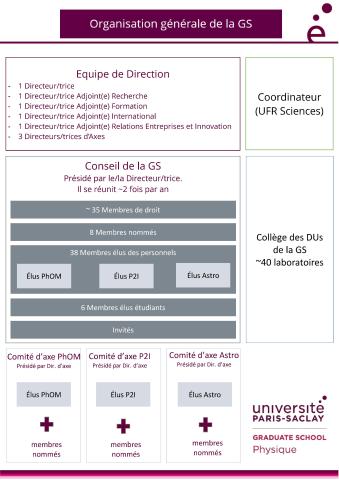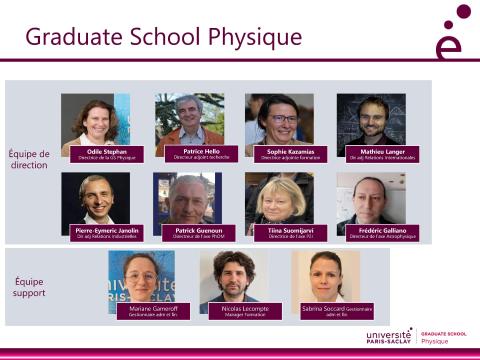
Organisation of the GS of Physics
The GS of Physics operates primarily through the following bodies:
- A Council
- A Director and a management team
- An Executive Committee composed of the management team and elected members from the Council
The GS of Physics is unique in that it is structured around three research areas (axes), each with its own governance structure (axis committees): Physics of the Two Infinities (P2I), Physics of Waves and Matter (PhOM) and Astrophysics.
The general organisation of the GS is based on several internal bodies:
- a Council chaired by the Director of the GS
- a Director and a management team
- an Executive Committee composed of the management team and elected members from the Council
- 3 Axis Committees,
and a College of Unit Directors. The College of Unit Directors (DUs) is made up of the heads of the laboratories/research units involved in the GS or their representatives, or, when the institution so decides, representatives of groups of units from that institution. The College of DUs receives the minutes of the Council meetings. It is invited to GS Council meetings at least once a year.
Eleven operators commit resources to research and training in physics. Their representatives serve as ex officio members on the Council.
- University components: UFR Sciences d'Orsay (coordinator, Faculty of Sciences in Orsay), Polytech Paris-Saclay, OSUPS
- Associated member universities: UVSQ, UEVE
- Component institutions: ENS Paris-Saclay, CentraleSupélec, IOGS
- Associated research organisations: CNRS, CEA, ONERA
The coordinator institution contributes to the coordination and consistency of the resources committed by the various operators to ensure the functioning of the GS. The three research axes have their own governance (axis committee).

The management team is composed as follows:
The Bureau, consisting of the Director, Deputy Directors, Axis Directors and other members of the GS Council (elected members and ex officio members), as well as an administrative assistant, is responsible for preparing and monitoring matters relating to the GS's main areas of activity. The Bureau's term of office ends with that of the Director.
It is appointed by the Director and approved by the GS Council. It enables decisions to be taken outside of Council meetings:
- Makes decisions on the execution of the cross-functional budget and reports to the Council
- Responds (within short deadlines) to Université Paris-Saclay requests on cross-functional issues
- Monitors matters relating to the GS's main areas of activity and reports to the Council
- Assists the Director in preparing Council meetings.
Research axis and their committees:
The research axis committees are primarily responsible for research and innovation, but also participate in activities where there is a strong link between education and research. They can also act as a first point of discussion before the GS Council.
In particular, the research axis committees have the following responsibilities:
- Participating in the development of the university's research and innovation strategy within their area of responsibility,
- Participating in the definition of internal calls for projects within the university,
- Proposing a platform policy, consistent with that of the university, within its scope,
- Expressing its human resource needs in training and research,
- Proposing HDR (Habilitation) advisors covering its themes,
- Exercising authority to investigate at their level and decide within their scope on:
- Internal calls for projects within the research axis,
- Activities related to coordination, joint programming and research forecasting within the scope of the research axis,
- The development or continuation of research partnerships within the scope of the research axis (national, international, socio-economic) in line with the university's strategy. - Exercising authority to investigate at their level and/or issue an opinion within the scope of the research axis on:
- Plans for new laboratories and research structures,
- The local implementation of the policy to support researchers and young researchers,
- Resource requirements: HR, technical platforms, etc.
- Calls for external projects requiring arbitration by the University. - To be informed about:
- The appointment of Unit Directors within the scope of the research axis,
- The appointment of Doctoral School Directors within the scope of the research axis.
The Graduate School Council was elected during the elections held from 25 to 29 January 2021. It is statutorily composed of 44 elected members (university staff and Master's and Doctoral students), 8 appointed members and 35 ex officio members. The elected members of the Council are the elected members of the research axis committees.
Responsibilities of the GS Council:
- Participate in developing the university's training and international outreach strategy within the scope of the GS,
- Participate in the development of shared research and innovation strategies between the different axes, training and international outreach strategies for the university within its scope, based on the recommendations of the axis committees,
- Issue opinions on the organisation and development of M, D, M+D level courses and Graduate and Research Programmes,
- Issue opinions on course accreditation applications and plans for new courses within the scope of the GS,
- Participate in defining internal calls for projects at the university based on the recommendations of the axis committees,
- Express human resource needs in training and research within the scope of the GS, based on the recommendations of the axis committees, unit directors, and, where applicable, the Bureau or a specific commission,
- Define a platform policy, consistent with that of the university and in consultation with the axis committees, within its scope,
- Create any commission or committee it deems useful,
- Coordinate the GS's activities with the university's other Graduate Schools and with the university's ‘cross-disciplinary’ and/or interdisciplinary structures, based on the recommendations of the research axis committees,
- Be competent to investigate at their level and decide within their scope on:
- Internal calls for projects within the GS, based on the recommendations of the axis committees,
- The distribution of funds allocated to the GS, in accordance with its missions, except for funds earmarked by the university's board of directors on an exceptional basis,
- Activities involving coordination, joint programming and forward planning in research across GS entities,
- The development or continuation of partnerships (national, international, socio-economic) in line with the university's strategy, based on the recommendations of the axis committees,
- Measures to support students and doctoral candidates in their professional projects, in accordance with those decided by the CFVU and the doctoral college,
- Measures to promote the reception of students and doctoral candidates in research laboratories, in accordance with those decided by the university's councils and committees, in particular the CFVU and the doctoral college. - Be competent to provide guidance at their level and/or issue opinions within their scope on:
- New laboratory and research facility projects, based on the recommendations of the axis committees,
- The local implementation of the policy to support researchers and young researchers, based on the recommendations of the axis committees.

